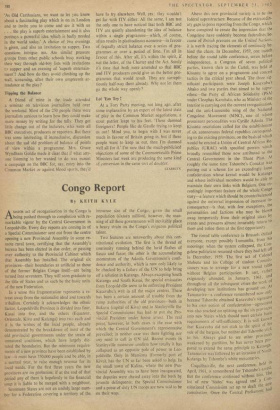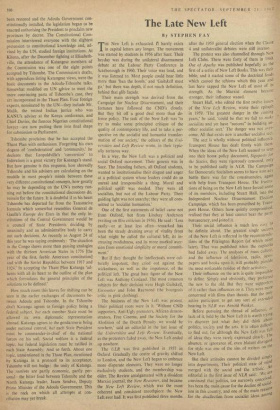Congo Report
By KEITH KYLE
AMAJOR act of reorganisation in the Congo is being pushed through to completion with re- markable vigour by the Central Government in Leopoldville. Every day reports are coming in of
a Special Commissioner sent out from the centre opening a new Provincial Assembly in some re- mote rural town, certifying that the Assembly's bureau has been elected in due order, or passing over authority to the Provincial Cabinet which that Assembly has installed. The original six
provinces--their boundaries as artificial as those of the former Belgian Congo itself—are being turned into seventeen. They will soon graduate to the title of States and as such be the basic units of the new Federation.
In a sense this fragmentation represents a re- treat away from the nationalist ideal and towards tribalism. Certainly it acknowledges the ethnic factor. Leopoldville Province is divided into four, Kasai into five, and the others (Equateur, Orientale, Kivu and Katanga) into two each and it is the wishes of the local people, already demonstrated by the breakdown of most of the old provincial governments under the strain of unnatural coalitions, which have largely dic- tated the boundaries. But the minimum require- ments of a new province have been established by law—it must have 750,000 people and be able, in a normal year, to raise enough revenue for its local needs. For the first three years the new provinces are on probation; if at the end of that period any of them is hopelessly in the financial soup it is liable to be merged with a neighbour.
Seventeen States are not an unduly large num- ber for a Federation covering a territory of the immense size of the Congo; given the small population (sixteen million), however, the man- ning of all these governments will inevitably place a heavy strain on the Congo's exiguous political talent.
Two features are noteworthy about this con- stitutional evolution. The first is the thread of continuity running behind the lurid flashes of fiasco and farce; the other is the accumulating momentum of the Adoula Government's confi- dence and authority, which is now only likely to be checked by a failure of the UN to help bring off a solution in Katanga. Always excepting South Katanga and South Kasai, the special emissaries from Leopoldville seem to be enforcing President Kasavubu's writ in all the major centres. There has been a certain amount of trouble from the rump authorities of the old provinces--both in Bukavu (capital of Kivu) and in Stanleyville the Special Commissioner has had to put the Pro- vincial President under house arrest. The real point, however, in both cases is the case with which the Central Government's representative prevailed; in neither case was there fighting nor any need to call in UN aid. Recent events in Stanleyville moreover confirm how totally it has collapsed as an opposite pole of power to Leo- poldville. Only in Maniema (formerly part of Kivu), has the UN so far been asked to help. In the small town of Kalina, w here the new Pro- vincial Assembly was to have been inaugurated, the deputies were chased away into the bush by juvenile delinquents; the Special Commissioner and a posse of sixty UN troops are now said to be on their way.
Above this new provincial variety is to be the federal superstructure. Because of the extraordin- ary gaps in press reporting from the Congo, which have conspired to create the impression that the Congolese have suddenly become federalists be- cause of British pressure on the United Nations, it is worth tracing the elements of continuity be- hind the chaos. In December, 1959, one month before the round table conference, seven before independence, a Congress of seven political parties, known then as the Cartel, was held at Kisantu to agree on a programme and concert tactics in the critical year ahead. The three sig- nificant participants were Joseph Kasavubu's Abako and two parties that aimed to be supra- ethnic—the Party of African Solidarity (PSA) under Cleophas Kamitatu, who as Minister of the Interior is carrying out the current reorganisation, and the anti-Lumumba wing of the National Congolese Movement (MNC), one of whose prominent personalities was Cyrille Adoula. The Kisantu resolutions called for the establishment of six autonomous federal republics correspond- ing to the existing provinces, on the basis of which would be erected a Union of Central African Re- publics IURAC) with specified powers %%ilia' broadly resembled those now attributed to the Central Government in the Thant Plan. At roughly the same time Tshombe's Conakat was putting out a scheme for an exceedingly loose confederation whose kernel would be Katanga and whose individual members would be able to maintain their own links with Belgium. One e\- ceedingly important feature of the whole Congo story—a feature which should be counterbalanced against the universal impression of incessant in- consequence—is that, with few exceptions, the personalities and factions who may be blown away temporarily from their original ideas by events and pressures almost invariably return 10 them and refine them at the first opportunity.
The round table conference in Brussels shifted everyone, except possibly Lumumba, from his moorings; when the system collapsed, the Con- golese politicians resumed where they had left Off in December, 1959. The first act of Colonel Mobutu and his College of student Commis- sioners was to arrange for a new round table without Belgian participation. It met, rather exiguously attended, in January,96 work of throughout all the subsequent crises thicwl.. o developing new .institutions has ground on. At Tananarive—a conference remembered now onlY because Tshombe obtained Kasavubu's signatul e to his own notion of confederation--agreement was also reached on splitting up the six provinces into new States which should meet certain basic requirements of self-sufficiency. it is well known that Kasavubu did not stick to the spirit of ,his side of the bargain, but neither did Tshombesock to his. Always glad to see other provinces weakened by partition, he has never been Pre- pared to extend the same principle to Katanga' Tananarive wasiollowed by an invasion of North Katanga by Tshombe's white mercenaries. Coquilhatville, the next conference, held it! April, 1961, is remembered for Tshombc's arrest' But the conference continued without him. The list of new 'States' was agreed and a Cori
stitutional Commission set up to draft the new had constitution. Once the Central Parliament been restored and the Adoula Government con- stitutionally installed, the legislation began to be enacted authorising the President to proclaim new provinces by decree. The Constitutional Com- mission interviewed everyone with the slightest pretension to constitutional knowledge and, ad- vised by the UN, studied foreign institutions. At Kitona, after the December fighting at Elisabeth- ville, the attendance of Katangese members of the Commission was one of the eight points accepted by Tshombe. The Commission's drafts, with appendices listing Katangese views, were the basic documents in the Adoula-Tshombe talks. Somewhat modified on UN advice to meet the more convincing parts of Tshombe's case, they are incorporated in the Thant Plan. Four foreign experts, nominated by the UN—they include Mr. Malik, the retired Indian justice who was KANU's adviser at the Kenya conference, and Chief Davies, the famous Nigerian constitutional lawyer—are now putting them into final shape for submission to Parliament.
Tshombe proclaims that he has accepted the Thant Plan with enthusiasm. Forgetting his own slogans of 'confederation' and 'community,' he declares that Leopoldville's 'conversion' to federalism is a great victory for Katanga's stand.
But how genuine is this response, how shrewdly Tshombe and his advisers are calculating on the muddle in most people's minds between these very different constitutional concepts, how greatly he may be depending on the UN's money run- ning out before the constitutional discussions do, remain for the future. It is doubtful if in his heart Tshombe has departed far from the Tananarive formula which somewhat resembles General de Gaulle's Europe des Etats in that the only in- stitutions of the Central Government would be a council of State Presidents deciding by unanimity and an administrative body to carry out such decisions. As recently as August 24 of this year he was saying ominously : 'The situation in the Congo shows more than passing analogies with the thirteen American States in 1776 [the year of the first, feeble American constitution] and with the Soviet Republics between 1917 and 1924.' In accepting the Thant Plan Katanga 'ad- heres with all its heart to the outline of the plan which formulates the general principles of the solutions to be defined.'
How much room this leaves for shifting can be seen in the earlier exchanges of documents be- tween Adoula and Tshombe. In the Tshombe draft Katanga agrees to foreign policy being a federal subject. bat each member State must be allowed its own diplomatic representation abroad. Katanga agrees to the gendarmerie being under national control, but each State President must be commander-in-chief of the national forces on his soil. Social welfare is a federal topic, but federal legislation must be ratified in each State Assembly. And so forth. About one topic, unmentioned in the Thant Plan, mentioned by Katanga in a protocol to its acceptance, Tshombe will not budge: the unity of Katanga. The motives are partly economic, partly per- sonal the bitter feud between Tshombe and the North Katanga leader, Jason Sendwe, Deputy Prime Minister of the Adoula Government. This is the rock on which all attempts at con- ciliation may yet break.











































 Previous page
Previous page